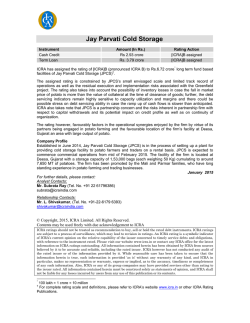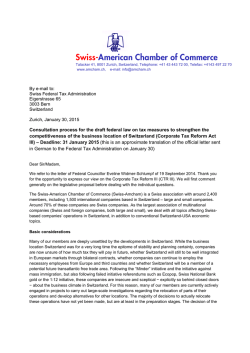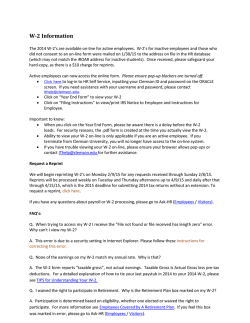
Doing Business in Spain - IBERAUDIT Kreston
Doing Business in Spain
DOING BUSINESS IN SPAIN
CHOICE OF LEGAL FORM
Business in Spain may be conducted by incorporated companies, partnerships, individuals and
branches of foreign constituted enterprises. Companies:
1.
Corporation - Sociedad Anónima (S.A.): The minimum capital amounts € 60.000,- divided in
shares It is possible to establish the company with a partial payment of the 25% (€ 15.000shares.
15 000 ).
)
Capital contributions can be made either in money or by other valuable rights, real estate or
goods, but for this non monetary contribution a special report must be issued by an expert
appointed by Commercial Registry.
2
2.
Limited Liability Company - Sociedad Limitada (S.L.):
(S L ): The minimum capital amounts € 3.000,
3 000
Capital contributions can be either monetary or non-monetary. The latter one does not require
expert's special report.
The corporate capital is not distributed in stock shares but in quotas ("participaciones") which
are always registered.
CHOICE OF LEGAL FORM
3.
Sole proprietorships: Law permits that companies (Corporation, and Limited Liability
Company) could have a sole shareholder. This fact should be declared to the Commercial Registry in
a term of six months in order to avoid transfer of liability from the company to the sole shareholder
or p
partner. This circumstance has to be inserted byy means of the expression
p
“sociedad unipersonal”
p
in all commercial and trading documents of the company.
4.
Branches:
belongs.
belongs
A branch is not a legal entity, but a part of the foreign company to which it
To set up a branch a public deed must be prepared and filed with the Mercantile Registry. The legal
and tax requirements for a branch are very similar to those required for a subsidiary.
Basically, the difference between a Branch and a Subsidiary is the personality and the corresponding
responsibility. Branch shares legal personality with the principal establishment as they are the same
legal entity.
AUDITING & ACCOUNTING REQUIREMENTS
The accounting is mainly regulated in Spain by the General Accounting Plan of 2008.
It is required to keep the necessary accounting records which must include at least the following
statutory accounting books:
▫
▫
▫
Journal ("Libro Diario")
General Ledger ("Libro de Inventario y Cuentas Anuales")
Annual accounts.
The statutory books must be duly stamped in the Mercantile Registry,
Registry and the company must keep
these records together with related business documents for at least six years from the date of the
last entry.
AUDITING AND ACCOUNTING REQUIREMENTS
1.
▫
▫
▫
Auditing is obligatory for all companies which for two consecutive years fulfill at least two of
the following conditions:
Net Annual sales above Euro.
Euro 5.700.000
5 700 000
Total assets above Euro. 2.850.000
Average number of employees above 50.
2.
Auditing is also obligatory for companies which, although not exceeding the above-mentioned
figures, fulfill certain conditions: for example, companies quoted on the Stock Exchange,
finance and credit companies; recipients of official subsidies; life insurance companies, etc.
3.
All commercial firms are obliged annually to deposit in the Mercantile Registry their annual
accounts, and also the Directors' Report. In this way, information about the accounts of all
companies is at the disposal of the public.
Th auditors'
The
dit ' reportt has
h to
t be
b deposited
d
it d in
i the
th Mercantile
M
til Registry
R i t together
t
th with
ith the
th annuall
accounts.
FINANCE & INVESTMENT
Exchange control
•
Spanish regulations regarding foreign exchange control have been liberalized. In general,
authorization is not necessary for the majority of foreign transactions.
•
Although authorization may not be required, some transactions must be notified to the Bank of
Spain. The withdrawal from or bringing into Spain of more than 10,000€- or the equivalent in a
foreign currency per person and trip, must be reported.
•
Shall be declared money transactions in Spain of more than 100.000€. This applies to residents
and non Spanish residents.
•
For payments between residents and non-residents and bank transfers which the amount
exceeds € 6,010.12- the bank will ask for information on the bank account and for data relating
to the transaction.
FINANCE & INVESTMENT
Sources of finance
•
Spain has a diversified and modern financial system, which is completely integrated within
international financial markets.
The law and money laundering
The Spanish
p
legal
g system
y
about moneyy laundering
g has been recentlyy modified to adjust
j
the
Spanish rule to the European regulation.
Among other innovations, the new law extends the number of professionals under obligation to
collaborate with the authorities,
authorities when there is a suspicion of money laundering,
laundering from not only
casinos, state agencies and finance companies, to now also auditors, advisors, consultants and
in some cases notaries, lawyers (not to forget that rules on lawyers’ professional secret prevail
over laws on money laundering) and solicitors.
DIRECT TAXATION / COMPANIES
•
Spanish resident companies are taxpayers of the Corporate Income Tax on their worldwide profits. The
standard rate of Spanish corporate income tax for the year 2012 is 30 %. However, small-size companies
(t
(turnover
l
less
th 10 million
than
illi Euro)
E ) benefit
b
fit from
f
a reduced
d
d rate
t off 25% applicable
li bl to
t the
th taxable
t
bl base
b
up to Euro 300.000, being the excess subject to standard rate 30%. This tax rate could be reduced till
20% if some employment rules are followed (maintain or employment increase) and annual turnover
less than 5 Million Euro.
•
There are three payments on account: the first till the 20th April, the second till the 20th October and
the third the 20th December. The Corporate tax should be paid during the 25 days following the 6
months after the end of the financial year. It means, actually, that if the financial year finishes on 31st
December the Tax return should be fulfilled during the 25 first days of July of the next year.
December,
year
Taxable profits
•
Taxable income is defined as the amount of income obtained in the tax period. This taxable income is
determined from the accounting records, as the difference between computable revenues and
deductible expenses.
•
Since January 2004 the decision from the ECJ in the Lankhorst-Hohorst case has been introduced in the
Spanish Corporate Tax Law. Therefore the thin-capitalization rules are no longer applicable when the
associated enterprise is resident in another EU Member Estate, so the repayments in respect of a loan
capital will no be considered as a covert distribution of profits.
DIRECT TAXATION / COMPANIES
Capital allowances
•
Capital allowances are deductible from profits. Depreciation is reflected on the accountancy
and that depreciation is deductible in order to determine the tax liability but there are some
limits established by the law. Free depreciation is allowed for investments in new fixed assets
acquired during year 2011 and from January to March 2012.
Interest payments
•
Interests payments are deductible from profits with the limit of 30%of operating Profits when
interest amount exceeds 1 Million Euro.
Royalty payments
•
Payments of royalties are also deductible. Moreover, the rules for associated companies are also
applicable when royalties are paid between associated companies: market value must be
justified.
•
If the payee is a non resident, the payment will be also withheld at 24,75 %. However if
royalties are paid to other European Member resident associated companies they will be
exempt from non resident income tax.
•
Treaties to avoid double taxation include special provisions for royalties and should be taken
into consideration when applicable.
DIRECT TAXATION / COMPANIES
Dividend payments
•
•
Dividend payments are not deductible from profits.
profits Dividends paid to a Spanish resident
company or individual are subject to a withholding tax, unless in some cases. Dividends paid to
non Spanish resident companies or individuals have also to be withheld. The general tax rate in
both cases is 21%.
As same as before,
before treaties to avoid double taxation have to be regarded as they usually
establish special rules for dividends.
Tax period
•
The tax period coincides with the economic period or exercise. The tax period cannot exceed
twelve months, unless it can be inferior.
Due dates for payment
•
The tax period coincides with the financial year declared without this being able to exceed
twelve months. The tax is accrued on the last day of the tax period.
Relief for losses
•
The Spanish Corporate Income Tax law permits companies to carry forward the losses incurred
in one year to the following 18 years.
DIRECT TAXATION / COMPANIES
During years 2012 and 2013 limitation for tax losses compensation are applicable for companies with
gross turnover higher than 20 Million Euros
Gross Turnover
Maximum Compensation
From 20 M € to 60 M €
50% profit
p
More than 60 M €
25% profit
DIRECT TAXATION / INDIVIDUALS
Overview
•
Individuals, who are Spanish residents according to the Spanish Personal Income Tax Law, are
taxpayers of this tax of their worldwide income and capital gains.
•
An individual
A
i di id l is
i understood
d t d to
t be
b a tax
t
resident
id t in
i Spain
S i when
h
any off the
th following
f ll i
circumstances arise:
-
•
Remaining
g in Spain
p
for more than 183 days
y during
g the calendar yyear.
Basing the core business or base for this activities or economic interests in Spain, directly
or indirectly.
Treaties to avoid Double Taxation Include Special Provisions Regarding residence criteria
and should be taken into consideration when applicable
None less, for individuals who become Spanish residents because they have moved to Spain for
work with a labor contract and their year salary is not higher that € 600.000, they can choose to
be taxed as non resident at fixed rate of 24,75% for all their Spanish Incomes.
DIRECT TAXATION / INDIVIDUALS
•
Tax system for Spanish residents (tax rate calculated from the application of progressive scales
ranging from 24,75%
24 75% to 56%)
Tax basis
(up to euros)
0,00
17.707,20
33.007,20
53.407,20
120.000,20
175 000 20
175.000,20
300.000,20
Gross tax due
(euros)
0,00
4.382,53
8.972,53
17.132,53
48.600,44
75 550 44
75.550,44
139.300,44
Remaining tax basis
(up to euros)
17.707,20
15.300,00
20.400,00
66.953,00
55.000,00
125 000 00
125.000,00
onward
Tax rate
24,75%
30,00%
40,00%
47,00%
49,00% (1)
51 00% (2)
51,00%
52,00% (3)
(1) In certain regions of Spain is applicable an additional rate of 2%, resulting 51%
(2) In certain regions of Spain is applicable an additional rate of 4%, resulting 55%
(3) In certain regions of Spain is applicable an additional rate of 4%
4%, resulting 56%
•
The tax period coincides with the calendar year: from January 1st to December 31st of each
year. The tax return must be presented to the Spanish Tax Administration between May 1st and
June 30th of the following year of the year accrued.
accrued
DIRECT TAXATION / INDIVIDUALS
Sole Traders
•
The self-employed are taxpayers of the Personal Income Tax, then, their worldwide income will
be subject to this tax. The Law refers to this income as income obtained from “economic
activities”, this is the self-organization of production means and human resources or of one of
them with the purpose of intervening in the production or distribution of goods or services.
Taxation of employees
•
Employees are taxpayers of the Spanish Personal Income Tax. Their taxable liability is
determined according to their salary.
•
The employer has two main obligations which are:
-
To pay the social security each month.
To present the tax return and to realize the payment regarding the withholding tax applied
over the salary of its employees. This duty has to be attended each quarter (for small-size
companies) or each month (big-size companies).
attended
Strict sanctions are applicable if these duties are no attended.
DIRECT TAXATION / INDIVIDUALS
Taxation of savings income
•
•
Savings income are withheld at the fixed tax rate of 21%. Referring to savings income derived from the
participation in a company (e.g. dividends) same withholding tax rate is applicable.
Final tax rate depends on total income:
Income from land and property
•
The income obtained by the letting of these sources has to be added to the taxable base. Rentals from
the letting of a house which has housing destination are reduced 60%. This reduction could be increase
to 100% if certain conditions are met. Not rented properties which are not the habitual housing, even
they are used by the owner or not, are taxed 2% or 1.10% applied over their cadastral value.
Capital gains
•
Capital gains will be taxed on fixed tax rate of 21%. However goods acquired before the 31st of
December 1994 have a reduction when calculating the capital gain derived from their selling. This
reduction rule does not apply for goods related to business activities.
DIRECT TAXATION / INDIVIDUALS
Taxation of savings income
Savings income are withheld at the fixed tax rate of 21%. Referring to savings income derived from the
participation in a company (e..g.
(e g dividends) same withholding tax rate is applicable.
applicable Final tax rate
depends on total income :
Taxable base on savings
Tax rate
Complementary levy
Total
from 0 to 6,000€
from 6,000€ to 24,000€
more than 24,000€
19%
21%
21%
2%
4%
6%
21%
25%
27%
Income from land and property
The income obtained by the letting of these sources has to be added to the taxable base. Rentals from
the letting of a house which has housing destination are reduced 60%. This reduction could be increase
to 100% if certain conditions are met. Not rented properties which are not the habitual housing, even
they are used by the owner or not, accrue a taxable income calculated as 2% or 1.10% applied over
their cadastral value.
Capital gains
Capital gains will be taxed on fixed tax rate of 21%. However goods acquired before the 31st of
December 1994 have a reduction when calculating the capital gain derived from their selling. This
reduction rule does not apply for goods related to business activities.
DIRECT TAXATION / INDIVIDUALS
Inheritance Tax
•
The inheritor of the deceased is bound to pay the inheritance tax on the net value of the assets
and rights acquired. That means that any inherited charges or obligations are deductible in
general.
general
•
The tax rate is determined by applying a tax scale, and it goes from 7.65% to 34%
•
It exists several Local and Regional Government rules that could give a substantial reduction in
the taxation for specific cases.
DIRECT TAXATION / INDIVIDUALS
Wealth/Net Worth Tax
This tax was not applicable since 1ST of January 2008.
However, the actual circumstances and the effects from economic crisis made it necessary its application with two
important changes:
-
The reintroduction is temporary for 2011 and 2012 and shall be presented in 2012 and 2013.
-
The limit of exemption in habitual residence has been increased until maximum of 300,000€ and the minimum
wealth value exemption is 700,000€. Depending on the Autonomous Community, mentioned amounts could be
different
This tax shall becomes chargeable on 31st December.
December
The positive tax basis (net wealth value) will be taxed according to the income tax rate scale approved by the
Autonomous Community were the tax payer is resident, or in its absence by the General scale approved by the State.
For 2011 the tax rate approved by the State is:
NON RESIDENTS CORPORATION TAX
Non-resident companies in Spain are subject to Company Income Tax for the revenues and capital
increases generated in Spain, and the revenues paid to them by residents.
Corporations with a permanent establishment
Non residents
N
id t who
h obtain
bt i revenue through
th gh a permanentt establishment
t bli h
t in
i Spain
S i shall
h ll be
b taxed
t
d on all
ll
the revenue that may be imputed to that establishment, whatever the source from which it is
obtained.
The general taxation rate is the same than for the Sp. Corporations, 30% when certain conditions
are met complementary tax applicable for income distributed outside Spain.
Corporations without a permanent establishment
The income obtained without a permanent establishment being used must be taxed separately for
each total or partial accrual of the income taxed.
The general taxation rate of 24,75% will be applied to the taxable base obtained. However for
capital gains financial income the tax rate applicable is 21%.
INDIRECT TAXES
Value Added Tax
Value Added Tax is chargeable on all sales of goods in Spain, together with all services given by
businesses in Spain, acquisitions of goods in the European Union and imports.
It is chargeable at three positive rates, the lower rate of 4%, the reduced rate of 10% and the
standard rate of 21%.
C t
Customs
D t
Duty
Imports are subject to VAT and customs duties. The concept of import only refers to merchandises
coming
g from non European
p
Union Member Countries,, as this matter has been harmonized inside the
European Union based on the principle of free circulation of goods, establishing a uniform system for
taxing imports on the Community Customs Code.
Taxable base in both cases is different; moreover the custom duty has to be added in order to
determine the taxable base for import VAT.
OTHER TAXES
Stamp Duty
Stamp duty is payable for Spanish residents and non residents who acquire goods or rights in Spain.
The tax rates are as follows:
-
Property sales: from 3% to 10%
Corporate transactions: 1%
Execution public documents: from 0.5% to 2%
Economic Activities Tax
An annual tax, at fixed amounts in the tax code, is levied on the practice of professional and
industrial activities by individuals and companies and taking into account the floor area of the
premises occupied for the performance of the activity. Companies which annual turnover is under
E
Euro
1 000 000 are exemptt to
1.000.000
t pay this
thi tax.
t
CONTACT
CONTACT
INTERNATIONAL CONTACT OFFICE
Av. Diagonal, 520, ground floor, 6
08006- Barcelona
Tel.: 00 34 93 362 31 23
Fax: 00 34 93 414 06 18
[email protected]
For assistance with Iberaudit Offices please contact
Elena Ramírez
CONTACT
A Coruña
C/ Juan Flórez, 24 1º Dcha.
15004 A Coruña
Tel: 981 92 72 19
Fax: 981 14 59 24
[email protected]
Alicante
Ali
t
Explanada de España, 1 - 2ºIzq
03002 Alicante
Tel: 965216109
Fax:965219422
[email protected]
Barcelona
Av. Diagonal 520 bajos 6ª
08006- Barcelona
Tel: 93 362 31 23
Fax: 93 414 66 02
[email protected]
Bilbao:
Gran Vía, 8 – 4º
48001 Bilbao
Tel: 94 423 34 25
Fax: 94 424 66 40
[email protected]
Gijón:
Calle Celestino Junquera nº1, 2ª
33202 Gijón
Tel.: 984 39 20 38
Fax: 984 05 07 69
[email protected]
Granada
Gran Vía de Colón, 8, Planta 3
18010 Granada
Tel.: 958 097 129
Fax: 958 097123
[email protected]
Madrid
M
d id
Calle Orense 16, 1º E
28020 Madrid
Tel: 91 417 23 14
Fax: 91 597 37 26
[email protected]
Madrid
Calle Sagasta, 26, 4º izqda..
28004 Madrid
Tel: 91 020 38 83
Fax: 91 752 43 70
[email protected]
Málaga:
Mál
Plaza Uncibay, 8 – 2ªpta. 5
29008 Málaga
Tel: 952 608 626
Fax: 95 222 31 41
[email protected]
CONTACT
Palma
P
l
de
d Mallorca
M ll
Francesc de Borja Moll nº 15, 3º A
07003 Palma de Mallorca
Tel: 971 10 90 20
Fax: 971 72 50 69
[email protected]
Sevilla:
Se
illa:
C/ Castelar, 5, 2ª dcha.
41001 Sevilla
Tel: 954 215 202
Fax: 954 56 07 72
[email protected]
Valencia
V
l
i
Pza. Ayuntamiento, 19, 8º A
46002 Valencia
Tel: 96 352 10 78
Fax: 96 351 14 84
[email protected]
Zaragoza:
Plaza Los Sitios,
Sitios 10,Pral.
10 Pral
50001 Zaragoza
Tel: 976 239 863
Fax: 976 231 031
[email protected]
Andorra:
Passatge M. Antònia Font Caminal, 1
Edifici Prat de les Oques, despatx 201
AD 700 Escaldes Engordany. Andorra
Tel: 00 376 867 804
[email protected]
Lisboa. Portugal:
Rua de S.
S Domingos de Benfica
Benfica,
33, R/C 1500-556 Lisboa. Portugal
Tel: +00351 218464790
Fax: +00351 218460570
[email protected]
@IBERAUDIT
@
www.iberaudit.es
IBERAUDIT Kreston
Iberaudit Coordination and Press Office (Filloy Consultors)
C/ Provença, 175 Ático 2
2ª · 08036 Barcelona · Tel: 93 419 19 86 · [email protected]
© Copyright 2026





